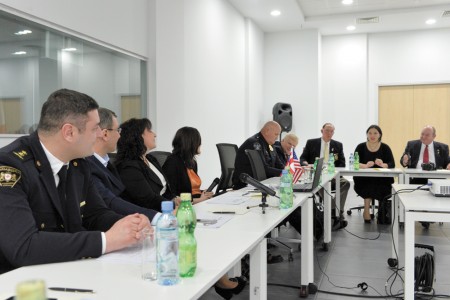
Brookhaven Police Chief Gary Yandura has taken advantage of opportunities to travel abroad for training—both in giving it and receiving it.
Yandura was invited to the Republic of Georgia this May by Georgia Bureau of Investigations Director Vernon Keenan to assess police services, leadership and management in the hope of setting up an exchange program.
“We met with police chiefs for seven precincts and had discussions,” Yandura said. “We exchanged basic information.”
The Brookhaven chief said visiting the Republic of Georgia with fellow chiefs from Doraville, Monroe and Garden City made him thankful for what he has at home.
The U.S. State Department has had an international exchange program for 25 years, Keenan said. Kennan invited Yandura on the trip to Georgia because they’ve worked together for more than 10 years and Keenan said he has “the utmost respect” for Yandura, who had also been to Israel through the state-funded program.
“He is experienced in international travel and I wanted to have professional chiefs who have been to a third-world country,” Keenan said. “The State Department asked me to come up with recommendations and [Yandura] was one of the first people I thought of.”
Sandy Springs Police Chief Ken DeSimone said it is not unusual for police departments to take advantage of training opportunities, with other cities in the United States and abroad. He said he and other Sandy Springs officers have trained in England, South Korea and Israel.
“We are a global society, with criminal networks disregarding boundaries,” he said. “Criminals today link together with sophisticated networks and are very adaptive in their thinking.”
The taxpayers don’t pay for these trips, but the experience gained by their leaders helps communities at home, chiefs say.

In 1991, the Supreme Council of the Republic of Georgia declared independence from the U.S.S.R., and in 1992 became the 179th member of the United Nations. Today, Georgia is a presidential democracy.
Yandura said he felt safe in the relative seclusion of one city he visited, which was a four-hour drive into the mountains from the embassy in Tbilisi, the capital. He said he could envision more and more tourists over the next five years.
The small village reminded Yandura of a ski resort, he said, where maybe 20 people live during the summer but many more come in during the winter months. He described the city as primitive but progressing.
Still, he said, the city doesn’t have fire hydrants, and fire trucks only have half-inch-wide hoses. When a fire breaks out, Yandura said firefighters just try to prevent it from spreading and save the buildings around the fire.
Another problem Yandura learned about involved distrust of police in the Republic of Georgia. Because the country only recently established itself as independent, the citizens don’t have a lot of faith in their police, he said. They also don’t get much of a chance to communicate with law enforcement officials, Yandura said.

“One of the things we found out was the police are seen everywhere, but they drive around on the streets,” Yandura said. “Traffic is terrible—they [officers] drive with lights activated all the time. They don’t have too much interaction with the public.”
Dunwoody Chief of Police Billy Grogan went to the Republic of Georgia in 2010, when he provided leadership training to the Georgian Police and shared his experiences of starting the Dunwoody Police Department from scratch.
“[The Republic of] Georgia had recently fired all of their police officers and was in the middle of rebuilding their department with the help of the Department of State,” Grogan said. “I also recently provided, in April 2015, media relations and law enforcement’s use of social media training to the Georgian Police.”
Grogan said the ability to help train a developing police department in best practices of a professional law enforcement department was a great opportunity to showcase law enforcement in Dunwoody.
“It was also a great opportunity to share some of the success Dunwoody has had as a police department, both in starting the department and in our use of social media,” Grogan said. “There was an exchange of information during these training sessions that benefitted all parties, and I was happy to partner with the Department of State to provide this training.”
Grogan said the federal government covered all the costs.
DeSimone said he believes that to be successful, officers and leaders have to be a step ahead.
“Learning from those experts, within their arena, provides an added layer of experience, which is very beneficial as we implement those practices at home,” DeSimone said.
